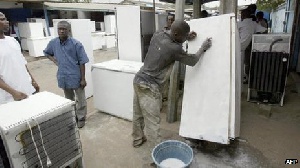A ban on the import of second-hand refrigerators is coming into force in Ghana to reduce energy consumption and harm to the environment.
Many old fridges contain chemicals called Chlorofluorocarbons (CFCs) which damage the Earth's ozone layer.
Although these are already banned or being phased out, they are thought to be commonly used in Africa.
The head of Ghana's energy commission told the BBC the ban made Ghana "a pioneer in West Africa".
The ban was first introduced in 2008 but was extended to give dealers time to adjust.
However, some Ghanaian traders have criticised the ban, saying thousands of jobs will be lost.
Energy commission head Alfred Ofosu-Ahenkora says the second-hand refrigerators are harming the country as they were not built for use in Africa and so consume too much electricity.
The commission says some two million used fridges have been imported to Ghana, mainly from the European Union. Fridge factory
CFCs are banned under the Montreal Protocol on Substances that Deplete the Ozone Layer.
To discourage their use, Ghana has introduced a rebate scheme to encourage people to surrender their used refrigerators for a new one.
The BBC's Sammy Darko in Accra says not everyone can afford a new refrigerator, so the used ones are still in demand at the second hand shops that litter the streets of the capital's suburbs.
"We will lose our jobs next year - this is what takes care of us and our family," said salesman Albert Kwasi Breku.
But Mr Ofosu-Ahenkora says the solution is to manufacture fridges locally.
"It is not a matter of stopping some business but encouraging manufacturing. I think manufacturing will create more jobs than importation of second refrigerators."
Since CFCs were banned, many fridge manufacturers have replaced them with Hydrofluorocarbons (HFCs).
But last year a UN report warned that HFCs are a greenhouse gas which is 20% more potent that CO2 and so their use could hamper efforts to tackle climate change.
Ghana is also a common destination for "e-waste" - used computers and televisions from the West, which often contain toxic material.
General News of Monday, 31 December 2012
Source: BBC













